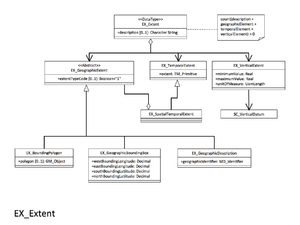TimePeriod
From Earth Science Information Partners (ESIP)
The printable version is no longer supported and may have rendering errors. Please update your browser bookmarks and please use the default browser print function instead.
gml:TimePeriod
| Elements | Domain | Definition and Recommended Practice | Examples | ||
|---|---|---|---|---|---|
| 1 | gml:description | 0..1 | xsd:string | Textual description of the date and time documented. | |
| 2 | gml:descriptionReference | 0..1 | xsd:string | ||
| 3 | gml:identifier | 0..1 | xsd:string | ||
| 4 | gml:name | 0..* | xsd:string | ||
| 5 | gml:relatedTime | 0..* | gml:TM_Primitive | ||
| 5 | gml:beginPosition | 1 | xsd:date xsd:dateTime |
The beginning date or date and time of the resource contents. Use the ISO 8601 extended standard: YYY-MM-DD or YYY-MM-DDThh:mm:ssZ. | beginPosition: 2010-06-05T12:00:17 |
| 6 | gml:endPosition | 1 | xsd:date xsd:dateTime |
If the resource has a status of 'ongoing' then use the indeterminatePosition attribute without an end date value. The ending date or date and time of the resource contents. Use the ISO 8601 extended standard: YYY-MM-DD or YYY-MM-DDThh:mm:ssZ. |
endPosition: 2010-06-05T12:00:17 endPosition: indeterminatePosition="now" |
| 7 | gml:duration | 0..1 | xsd:duration | Provide either gml:duration or gml:timeInterval if applicable. Length of time between measurements. Use the ISO 8601 syntax for temporal length. |
duration: P1D |
| 8 | gml:timeInterval | 0..1 | xsd:decimal | Provide either gml:duration or gml:timeInterval if applicable. Frequency between time events based on floating point values for temporal length. |
timeInterval unit="hour": 1.0 |
Please contribute!
<gml:TimePeriod gml:id="someTimeID"> <gml:beginPosition>1846</gml:beginPosition> <gml:endPosition indeterminatePosition="now"/> </gml:TimePeriod>
<gml:TimePeriod gml:id="timeId"> <gml:beginPosition>1992-01-01T00:00:00Z</gml:beginPosition> <gml:endPosition>2007-12-31T00:00:00Z</gml:endPosition> <gml:timeInterval unit="hour">6</gml:timeInterval> </gml:TimePeriod>


